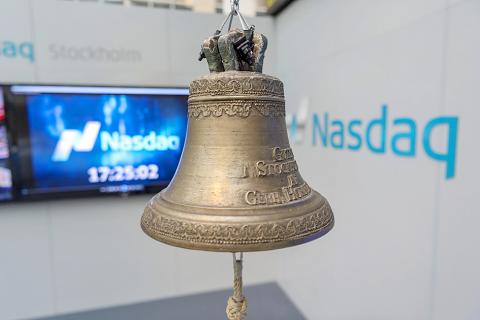European exchange operator Euronext NV yesterday increased its offer for the Oslo stock exchange to US$783 million, besting an offer from US rival NASDAQ.
Euronext said it was raising its offer to 158 kroner per share, which beats an offer made by NASDAQ on Jan. 30 of 152 kroner per share and its original bid of 145 kroner per share in December last year.
The NASDAQ offer was endorsed by the management of Oslo stock exchange, saying it was better for its capital market and companies.

Photo: Bloomberg
The US-based NASDAQ controls all of the other stock exchanges in the Nordic and Baltic region, while Euronext operates the Paris, Amsterdam, Brussels, Dublin and Lisbon markets.
In addition to putting more money on the table, Euronext said that its offer would help develop the Oslo stock exchange while maintaining its local identity.
“Euronext is committed to maintaining, investing in and developing Oslo Bors VPS as a key market infrastructure in Norway and internationally for the benefit of all stakeholders,” the company said.
“Continuity, local governance and decentralized decision-making are the key principles of Euronext’s model,” it added.
Euronext’s original offer had already attracted the binding acceptance of more than half of shareholders.
Unless either Euronext or NASDAQ withdraws its bid, the future ownership of the Oslo exchange is likely to be decided by Norwegian authorities.
Official approval is required for any acquisition of more than 10 percent.

The US dollar was trading at NT$29.7 at 10am today on the Taipei Foreign Exchange, as the New Taiwan dollar gained NT$1.364 from the previous close last week. The NT dollar continued to rise today, after surging 3.07 percent on Friday. After opening at NT$30.91, the NT dollar gained more than NT$1 in just 15 minutes, briefly passing the NT$30 mark. Before the US Department of the Treasury's semi-annual currency report came out, expectations that the NT dollar would keep rising were already building. The NT dollar on Friday closed at NT$31.064, up by NT$0.953 — a 3.07 percent single-day gain. Today,

‘SHORT TERM’: The local currency would likely remain strong in the near term, driven by anticipated US trade pressure, capital inflows and expectations of a US Fed rate cut The US dollar is expected to fall below NT$30 in the near term, as traders anticipate increased pressure from Washington for Taiwan to allow the New Taiwan dollar to appreciate, Cathay United Bank (國泰世華銀行) chief economist Lin Chi-chao (林啟超) said. Following a sharp drop in the greenback against the NT dollar on Friday, Lin told the Central News Agency that the local currency is likely to remain strong in the short term, driven in part by market psychology surrounding anticipated US policy pressure. On Friday, the US dollar fell NT$0.953, or 3.07 percent, closing at NT$31.064 — its lowest level since Jan.

The New Taiwan dollar and Taiwanese stocks surged on signs that trade tensions between the world’s top two economies might start easing and as US tech earnings boosted the outlook of the nation’s semiconductor exports. The NT dollar strengthened as much as 3.8 percent versus the US dollar to 30.815, the biggest intraday gain since January 2011, closing at NT$31.064. The benchmark TAIEX jumped 2.73 percent to outperform the region’s equity gauges. Outlook for global trade improved after China said it is assessing possible trade talks with the US, providing a boost for the nation’s currency and shares. As the NT dollar

PRESSURE EXPECTED: The appreciation of the NT dollar reflected expectations that Washington would press Taiwan to boost its currency against the US dollar, dealers said Taiwan’s export-oriented semiconductor and auto part manufacturers are expecting their margins to be affected by large foreign exchange losses as the New Taiwan dollar continued to appreciate sharply against the US dollar yesterday. Among major semiconductor manufacturers, ASE Technology Holding Co (日月光), the world’s largest integrated circuit (IC) packaging and testing services provider, said that whenever the NT dollar rises NT$1 against the greenback, its gross margin is cut by about 1.5 percent. The NT dollar traded as strong as NT$29.59 per US dollar before trimming gains to close NT$0.919, or 2.96 percent, higher at NT$30.145 yesterday in Taipei trading